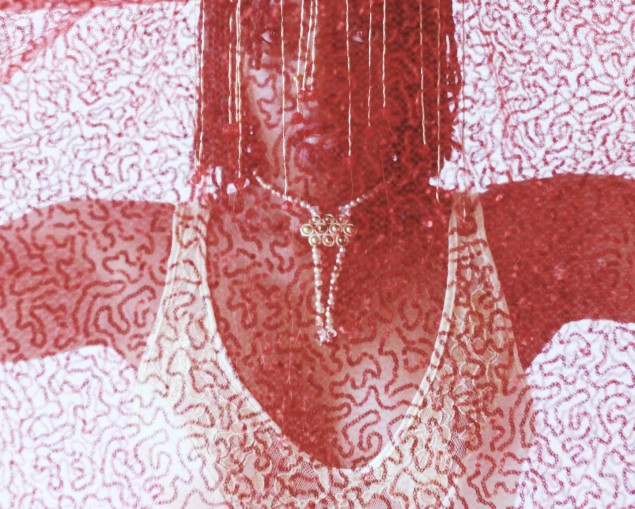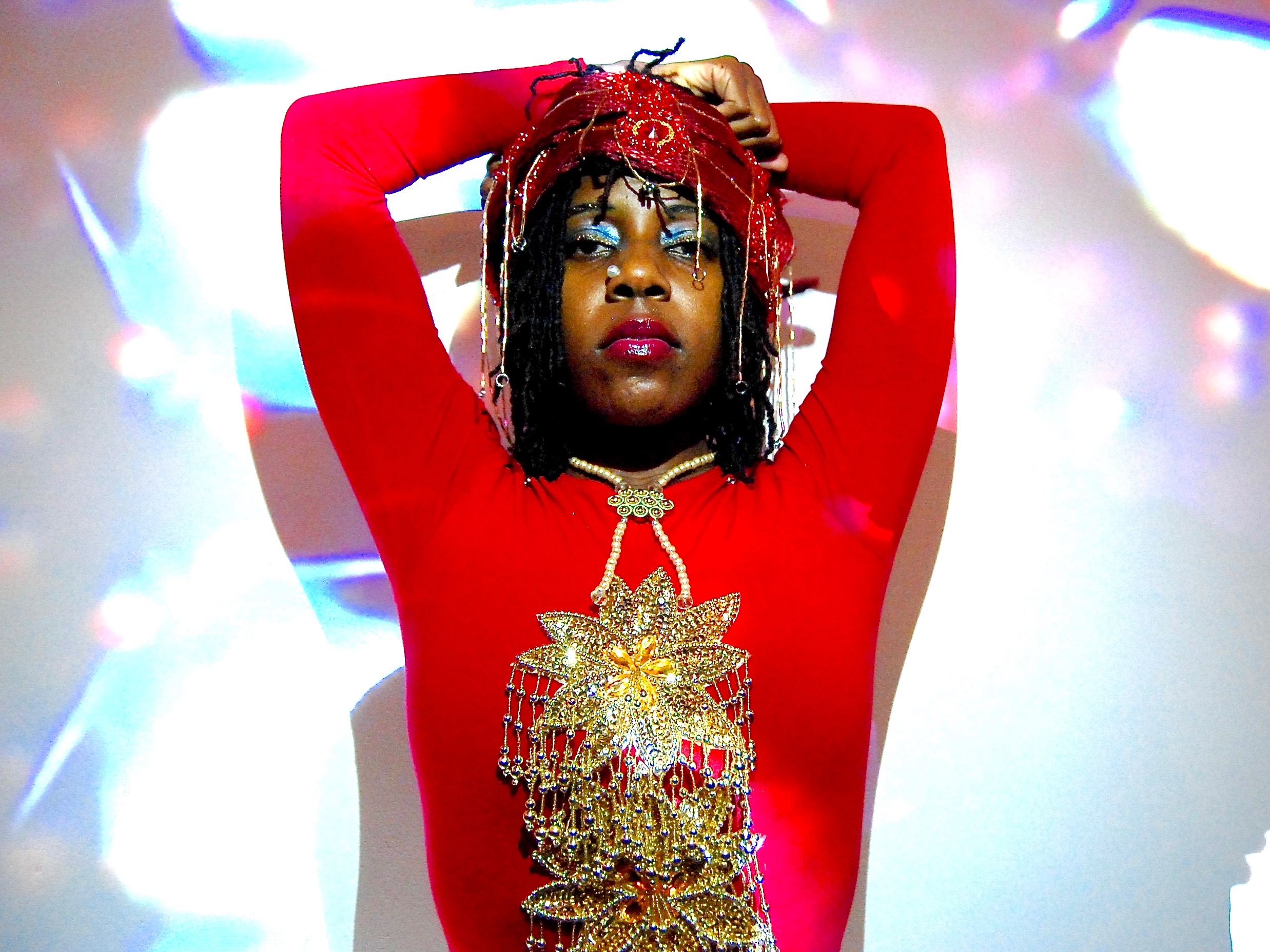If Francine Thirteen ever decides to start a religion, it would not be entirely surprising. Her music is steeped in the occult, she hails from a line of mystics, and she performs rituals at her shows. She refers to her album as a “sonic book of shadows” – an audio book of spells that she hopes will heal her audiences.
Her music is deep, her voice soulful. Her lyrics are profound, easy to understand, yet layered with meaning – they expose plot and character tension that are reminiscent of the gravitas of a Shakespearean drama. Set to electronic beats, the result is mesmerizing. Music has the power to inspire worship. And Francine’s aesthetic inspires a kind of devotion. She’s only been on the Dallas music scene for about six months, but her schedule is picking up speed with shows in Dallas and Austin this month. On Saturday she’ll have another chance to work her magic at City Tavern.
Raised in Dallas in the Baptist church, she sang in choir on Sundays. Her music has a gospel feel, although she gave up Jesus a long time ago. Now she preaches the gospel according to Francine, exploring complex topics in her music – cellular memory, religion, nature, patriarchy, and female archetypes.
For her forthcoming debut album 4 Marys and The King, Francine wrote each song from the perspective of one of four female characters: Sister Mary, Mother Mary, Lady Mary, and Queen Mary. Each of the Marys represents different feminine characteristics and a different elemental force of nature. Although there are biblical undertones to each, Francine drew ultimate inspiration from Auset – in Egyptian allegory the “Black Madonna,” and according to some mystics, the prototype for biblical stories of the Holy Mary. Francine delves into the psyches of these archetypal females, exposing their relationships with each other and their struggle against a dominant male figure known as the King.
In “Mother Mary,” the Queen Mother sings about her son:
“Take a look at his stride/ He’s so awash with pride/ No wonder they call him the holy one / Prince of truth, son of the sun…/ Oh you can call yourself king/ Of what you want to son / But you can’t ever erase / The woman who made you one / Dead or alive (kill the king) / He’s always mine (kill the king)”
[d-embed][/d-embed]
Francine says she wanted this song to show the interconnectedness of all beings on the planet, dead and alive, to their foremothers and to the great mother: the earth. Francine’s voice is haunting, and she repeats the final lines over and over, searing the lyrics in your mind.
Sometimes one Mary sings to another. The posturing, judgment, and tension is palpable, and the result is delectable. In the track “Queen Mary, The Water and Throne,” Lady Mary, the King’s mistress, sings to the Queen:
“You live all your days/ According to his ways/… Never show your true face/ Pretending high grace/…God save the Queen/ With a throne made of stone/ Long live the queen/ With a life not her own”
Francine uses the term “divine feminine,” which she defines as “the feminine representation of God…the sacredness and holiness of femininity, the female form, and the female experience.”
She says that her upbringing in the church, with male religious figures and in a male-dominated culture, didn’t jibe with her sensibilities. “We hear about the Father, Son, and Holy Ghost. There is no woman in that, so this is a reclamation, or a proclamation that we are present within the divine and not only present, but key.”
Despite the personality clashes and competition amongst all the King’s women, Francine says she exists within each of them. She used experiences from her own life and went back into her ancestral record, drawing from her mother’s, grandmother’s, and great-grandmother’s experiences to create her characters. At each of her shows, Francine plays the role of one of her Marys. Assuming a character is something she’s comfortable with as a theater alumna of Booker T. Washington High School.
In her most recent Dallas show at Aurora, part music and art exhibit, part ritual, she was Lady Mary, and performance artist Netherina Noble portrayed Mother Mary. The two enacted a “roses ritual”: Lady Mary paid her respects to Mother Mary by casting rose petals over her head. The two also shared a “holy drink” at an altar they created. Francine even blessed an audience member who was disrupting her performance by pouring a cup of water over his head and awakening him, so to speak. He left the scene peacefully.

The religious and ritual aspects of her work are not just compelling artistic devices. She’s using her work to heal her cellular memory and hopes her music and rituals will promote a similar healing in others. She said some people in the audience at Aurora were mystified but overall responded positively. Francine thinks the ritual resonated with them because it may have triggered their cellular memories of public rituals and a communal convening with the divine.
If you’re not familiar with the term “cellular memory,” it’s the concept that our experiences are stored in our cells. We can also inherit cellular memory from our ancestors – the experiences stored in their cells are passed onto us and manifest as memories, habits, phobias, and affinities for things we may have never experienced in our lifetimes.
“It’s something that we inherit. It’s something that we create. It’s something that’s always present. We can always be tapping in and reprogramming our stories to benefit us, rather than to destroy us. We can always strengthen the joyous part of our story,” says Francine. “I wanted the work to be something that was thought-provoking and healing, to maybe trigger certain ways of thinking, or maybe opening up the heart a certain way. When people talk about healing music, in my experience, it’s very positive. But I wouldn’t describe the work as being very positive. It explores the darker aspects of the psyche and of life.”
[d-embed][/d-embed]
Francine Thirteen debuted in Dallas at Soft Power: Intimacy, a cultural-equity gathering created by social practice artist Darryl Ratcliff. That one performance was enough to burn her into my mind. She was visually captivating – she donned a fabric-wrapped headpiece by Chesley Williams and a sequined bustier and matching skirt. Playing the role of Queen Mary that night, she carried herself like someone who is supremely self-possessed. The inner sanctum of Zhulong Gallery had been filled with the chatter of handfuls of people even as performers took the stage, but it seemed that once Francine got started, the gallery hushed. Smartphones emerged, capturing her likeness on tiny screens. A circle formed. From inside it, her voice radiated outward. B-boys who were scheduled to perform later, moved by the music, began to pop and lock to the slow beat of her music and her mournful voice. I won’t ever get that performance out of my head. I walked away with the chorus, “Dead or alive, he’s always mine” ringing in my ears. Maybe it triggered something in my cells.






